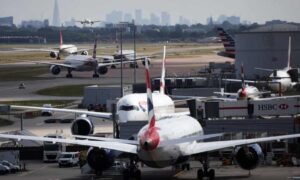
Engineers working remotely took 90 minutes to arrive and restart a crucial part of UK air traffic control’s IT system during the August bank holiday meltdown, according to an independent report.
The flights of more than 700,000 passengers were disrupted after planes were grounded across UK airports on 28 August, when the computerised flight planning system at National Air Traffic Sreervices (Nats) shut down because of a glitch.
An independent panel highlighted a “significant lack of pre-planning” at Nats, without “any multi-agency rehearsal of the management of an incident of this nature and scale”.
Airlines said the report, which was commissioned by the Civil Aviation Authority (CAA), showed Nats’ procedures were “wholly inadequate”. Ryanair repeated its calls for the Nats chief executive to be sacked.
When technicians on site were unable to solve the problem, the on-call specialist engineer found they could not carry out the fix working remotely. The report found it took 90 minutes for the on-call engineer to “arrive on-site in order to perform the necessary full system restart that was not permitted remotely”.
The interim report said: “It is clear there is a significant lack of pre-planning and coordination for major events and incidents that targets the alleviation and remediation of major incidents.”
Most flights were grounded for hours during one of the busiest days of summer, with subsequent disruption leaving some passengers stranded for days. Many were required to pay upfront for alternative flights, food and accommodation and submit claims to airlines for reimbursement.
The financial cost to passengers was “very considerable” and the report said the stress and anxiety was “at least as serious”.
The report found the incident was triggered by the inability of the Nats computer system to process unusual, but correct, data in a flight plan submitted for a plane crossing UK airspace to Paris from Los Angeles.
Two waypoints with an identical code triggered a “critical exception error” that caused the primary and secondary systems to disconnect themselves and stop working.
Tim Alderslade, the chief executive of Airlines UK, the industry body representing UK-registered carriers, said: “This report contains damning evidence that Nats’ basic resilience planning and procedures were wholly inadequate and fell well below the standard that should be expected for national infrastructure of this importance.
“We welcome the committee’s plans for further investigation to provide recommendations so that this kind of catastrophic failure is not allowed to happen again.”
